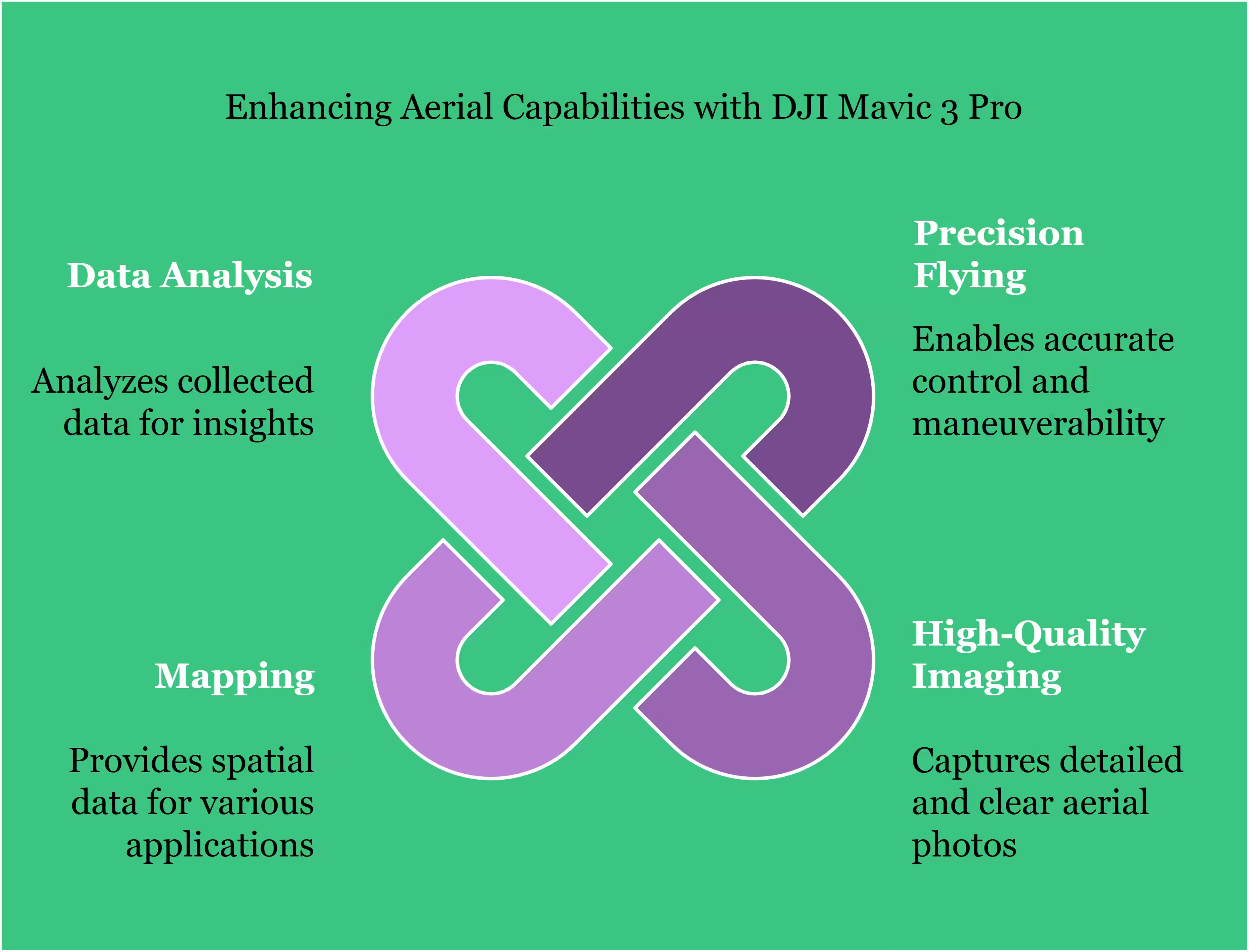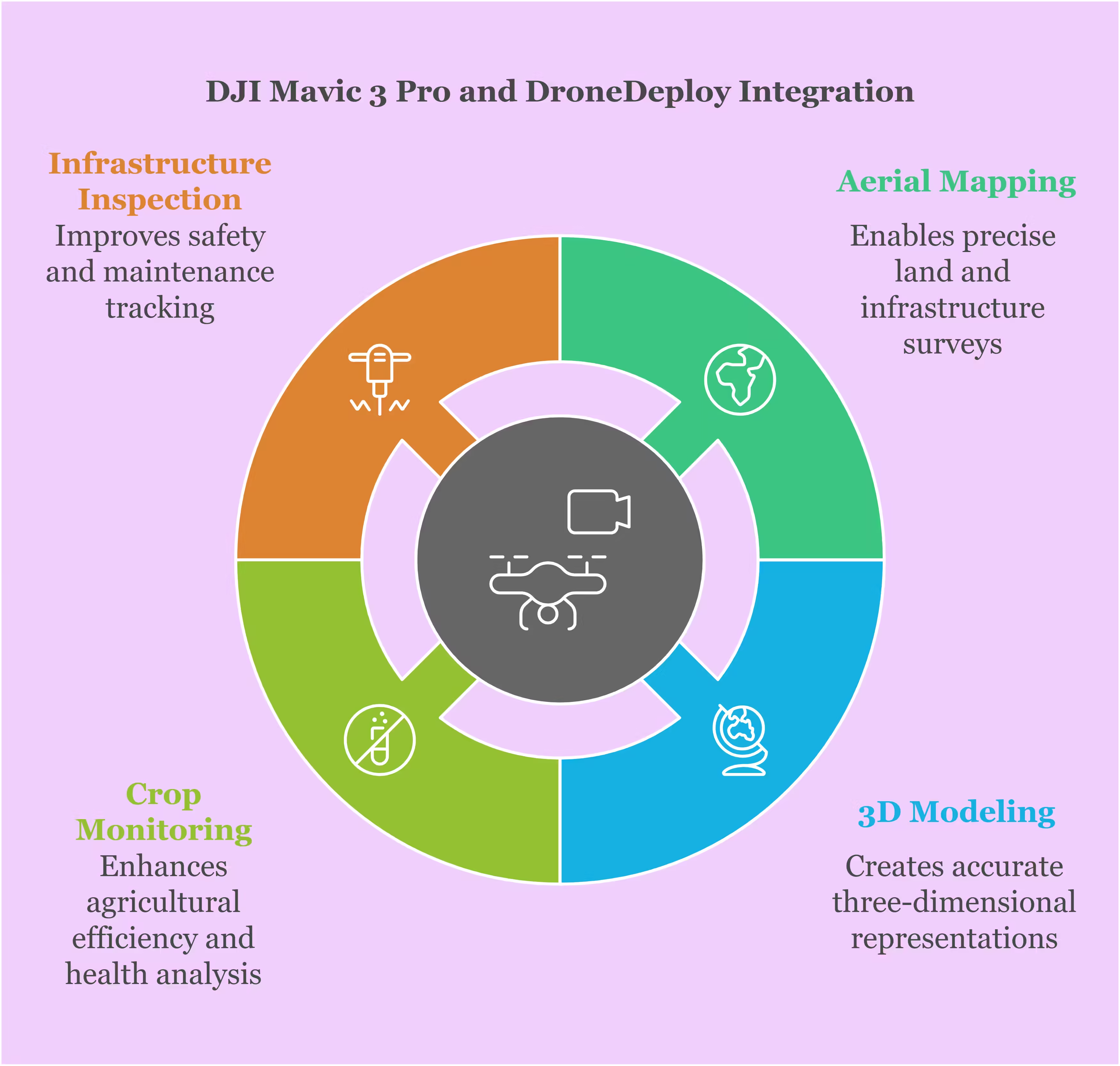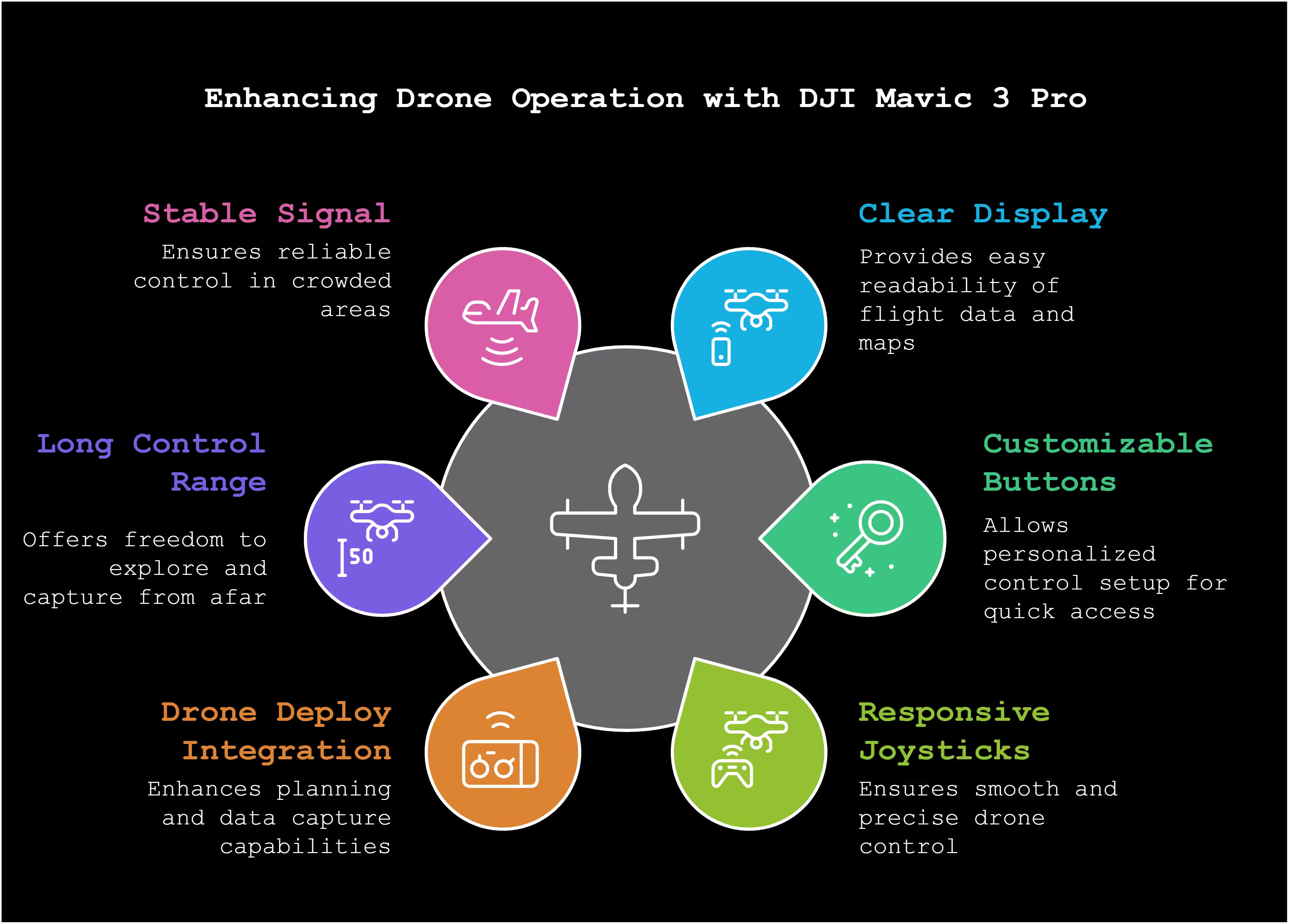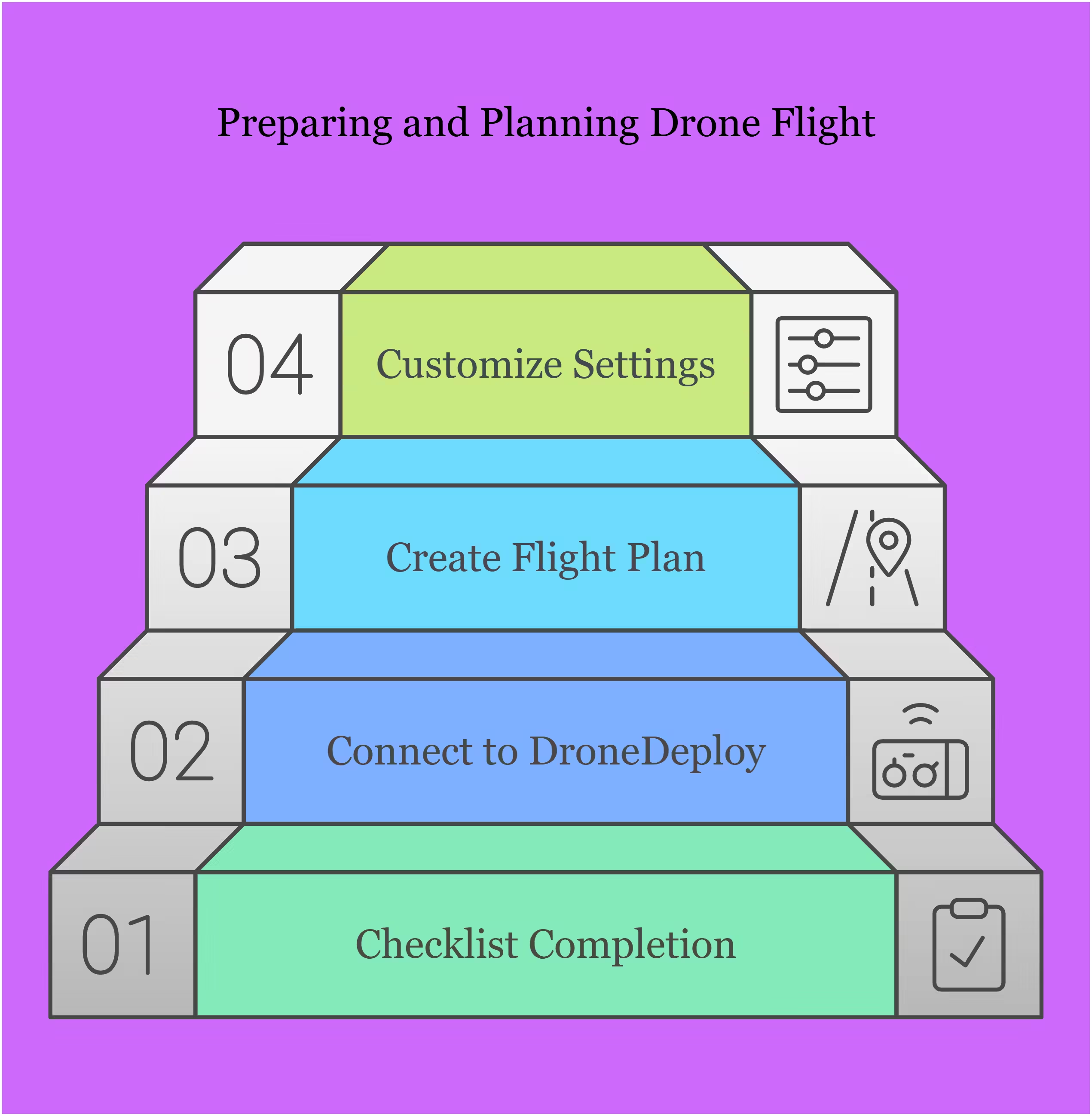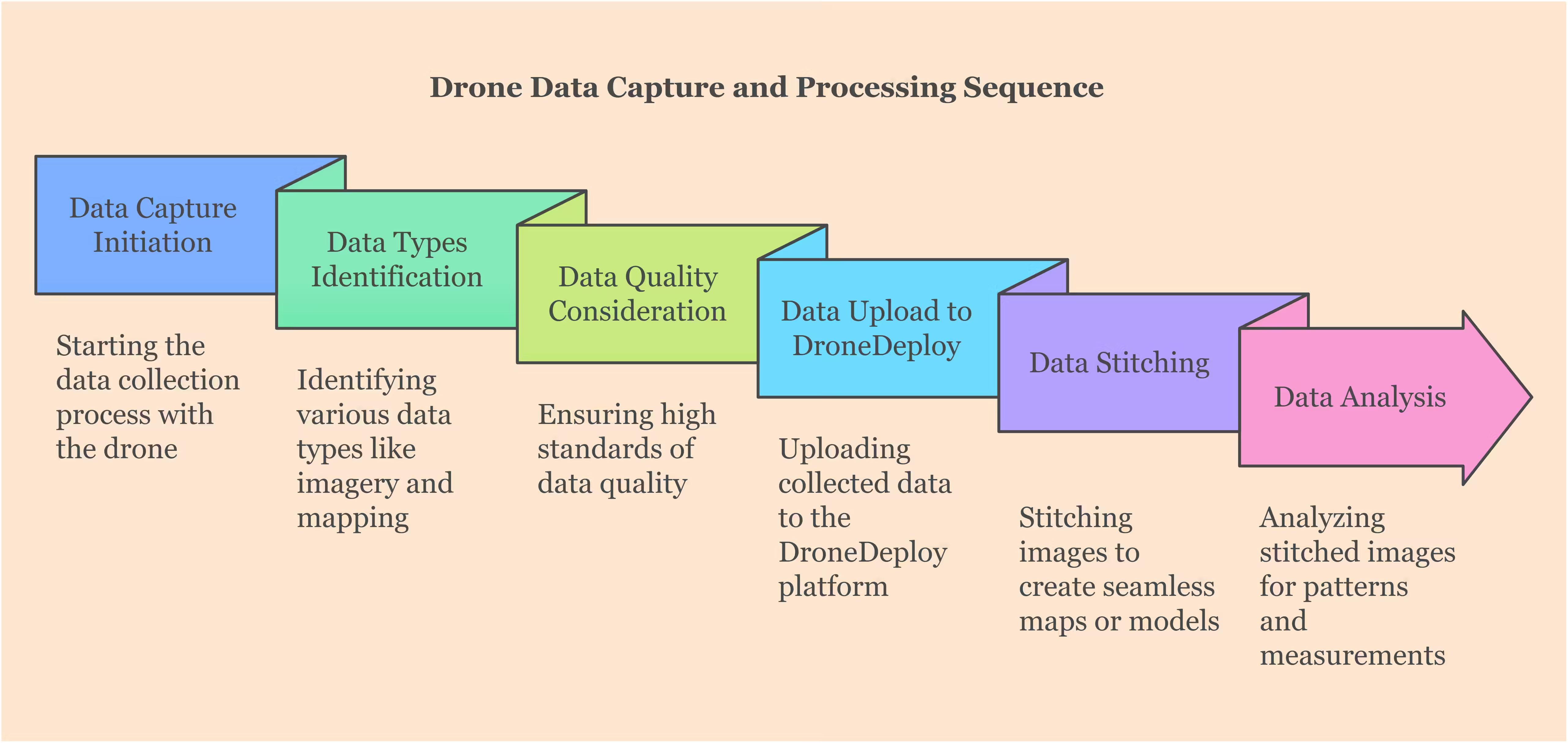Unmanned aerial vehicles, or drones, have soared in popularity. They capture breathtaking footage from the sky.Dji Mavic 3 Pro Controller With Drone Deploy
With the DJI Mavic 3 Pro, your aerial photography reaches new heights. This device is a top choice for hobbyists and professionals alike. The controller is your gateway to precision flying and high-quality imaging. Drone Deploy software takes it further, adding powerful mapping and data analysis to your flights.
Now, imagine controlling your DJI Mavic 3 Pro with ease. Picture seamless integration with Drone Deploy. That’s a reality now. The combo offers more than just flight control. It’s about detailed mapping and efficient data collection. This introduction will guide you through using the controller paired with Drone Deploy. It’s perfect for tasks like surveying land or inspecting structures. We’ll explore how this tech can be a valuable tool in various fields. Ready to see the world from above? Let’s dive in and discover the power of this duo.
Dji Mavic 3 Pro Overview
The DJI Mavic 3 Pro stands as a pinnacle of drone technology, boasting features that make it a top pick for both hobbyists and professionals. Its compatibility with Drone Deploy adds a layer of versatility, allowing users to map and analyze data with ease. This overview will shed light on what makes the Mavic 3 Pro stand out in a crowded market of high-flying tech.
Key Features
The Mavic 3 Pro comes packed with an array of features that cater to the needs of drone enthusiasts and professional cinematographers alike. It’s not just about the flight; it’s about the precision, the imagery, and the experience. Here are some of the key features:
- Dual-camera system: A 4/3 CMOS Hasselblad sensor paired with a telephoto lens.
- Advanced obstacle sensing: Six fish-eye sensors and two wide-angle sensors ensure safety from all angles.
- Extended flight time: Enjoy up to 46 minutes of flight, capturing more footage on a single charge.
- Omni-directional obstacle sensing: This feature provides the drone with the ability to detect obstacles in all directions, making it safer to operate.
When paired with Drone Deploy, the Mavic 3 Pro enables detailed data collection and analysis, making it ideal for tasks such as 3D mapping and site surveys. The drone’s high-resolution camera and stable flight capabilities ensure that the data captured is of the highest quality.
Specifications
The specifications of the DJI Mavic 3 Pro are a testament to its advanced engineering. Below is a detailed look at what this drone offers under the hood:
| Specification | Detail |
|---|---|
| Camera Sensor | 4/3 CMOS Hasselblad sensor |
| Video Resolution | Up to 5.1K at 50fps |
| Max Flight Time | 46 minutes |
| Obstacle Sensing | Omni-directional |
| Internal Storage | 8 GB, expandable via microSD |
| Max Transmission Range | 15 km (FCC), 8 km (CE) |
| Weight | Approx. 895 g |
This table offers just a glimpse of the Mavic 3 Pro’s capabilities. With its robust features and impressive specifications, this drone stands ready to tackle a variety of aerial tasks with unmatched efficiency. Drone Deploy’s compatibility further enhances its functionality, making complex tasks simpler and more accessible.
Dronedeploy Introduction
The DJI Mavic 3 Pro stands as a pinnacle in drone technology, paired seamlessly with the innovative software platform, DroneDeploy. This combination opens up a new realm of possibilities for both hobbyists and professionals. With the DJI Mavic 3 Pro’s advanced features and DroneDeploy’s intuitive interface, users can perform complex mapping tasks with ease and precision. Let’s dive into what makes DroneDeploy a key player in drone operations and the advantages it offers users.
What Is Dronedeploy?
DroneDeploy is a powerful cloud-based software that allows drone pilots to create aerial maps and 3D models. It’s designed to be user-friendly, enabling pilots of all skill levels to capture, analyze, and share their aerial data. With a few taps on a screen, the DJI Mavic 3 Pro controller can be transformed into a command center for sophisticated flight planning and data management. Here’s what sets DroneDeploy apart:
- Intuitive flight planning tools
- Automated flight functions for consistent data capture
- Real-time mapping capabilities
- Advanced analytics to interpret aerial data
- Easy collaboration and sharing options
DroneDeploy’s compatibility with the DJI Mavic 3 Pro enhances the drone’s utility, making complex tasks straightforward. For instance, agriculture professionals can monitor crop health, while construction teams can track project progress. This is possible due to the software’s ability to process high-resolution images into actionable insights.
Benefits For Users
Utilizing DroneDeploy with the DJI Mavic 3 Pro controller opens up a world of benefits for users. Whether you’re surveying land or inspecting infrastructure, the advantages are clear and significant. Below is a breakdown of key benefits that users enjoy:
| Benefit | Description |
|---|---|
| Enhanced Efficiency | Automate flight paths and data capture, saving time and resources. |
| Improved Accuracy | Accurate data collection for precise maps and models. |
| Data-Driven Decisions | Analyze aerial data to make informed decisions with confidence. |
| Easy Collaboration | Share maps and findings with teams or clients quickly. |
| Scalability | Adaptable to projects of any size, from small sites to vast landscapes. |
The benefits extend beyond these tangible outcomes. DroneDeploy empowers users to focus on analyzing results rather than worrying about the complexities of drone operation. With the DJI Mavic 3 Pro’s advanced camera system, users capture stunningly detailed images that DroneDeploy translates into valuable data points.
Controller Capabilities
The Dji Mavic 3 Pro Controller paired with Drone Deploy brings new levels of control and efficiency to drone flying. Let’s dive into the controller capabilities that make flying this drone a smooth experience. From the user-friendly interface to the impressive control range, every aspect is designed for ease and accuracy.
User Interface
The user interface of the Dji Mavic 3 Pro Controller is all about simplicity and functionality. It’s designed for pilots of all levels, making flying feel intuitive. Here’s what stands out:
- Clear Display: See everything at a glance. Flight data and maps are easy to read.
- Customizable Buttons: Set up controls the way you like. Quick access to important functions.
- Responsive Joysticks: Smooth and precise. Makes controlling the drone a breeze.
Connecting with Drone Deploy adds even more power. Plan flights, capture data, and more, right from the controller. It’s all there, in your hands.
| Feature | Description |
|---|---|
| Touch Screen | Interactive and easy to navigate. |
| Battery Life | Long hours of operation on a single charge. |
| Portability | Light and easy to carry. Take it anywhere. |
Control Range
The control range of the Dji Mavic 3 Pro with Drone Deploy is nothing short of impressive. It gives pilots the freedom to explore and capture from afar. Key highlights include:
- Long Distance: Fly up to 15 km away. Capture scenes from a distance.
- Strong Signal: Stable connection even in crowded areas. Reliable control at all times.
- Auto-Switch: The controller automatically switches frequencies. Ensures the best connection.
This wide range opens up new possibilities. From high-altitude shots to exploring hard-to-reach areas, the sky’s the limit. Safety features keep the drone within range and alert you if it strays too far. Fly with confidence and control.
| Range | Benefit |
|---|---|
| Up to 15 km | Freedom to explore more areas |
| Stable Signal | Reliable control for peace of mind |
| Auto-Switch Frequencies | Best connection at all times |
Both the intuitive user interface and the extensive control range make the Dji Mavic 3 Pro Controller with Drone Deploy an excellent choice for drone enthusiasts. It simplifies flying while expanding the possibilities of what you can capture and achieve.
Setting Up The Mavic 3 Pro
Embarking on a journey with the DJI Mavic 3 Pro drone brings the thrill of capturing stunning aerial footage. But first, setting up the drone correctly is crucial. A seamless setup ensures flawless flights and epic captures Whether you’re a seasoned pilot or a beginner, understanding the setup process enhances your drone-flying experience. Let’s dive into the initial setup and how to connect to DroneDeploy, a powerful tool for mapping and aerial data analysis.
Initial Setup
Getting your Mavic 3 Pro airborne starts with a proper initial setup. This phase is vital to ensure safety and optimal performance. Follow these steps to get started:
- Unbox the Mavic 3 Pro and lay out all components.
- Charge the drone’s battery and the controller until full.
- Attach the propellers to the drone. Make sure they’re secure.
- Turn on the drone and the controller.
- Download and install the DJI Fly app on your smartphone.
- Connect your phone to the controller using the provided cable.
- Follow the in-app instructions to pair the drone with the controller.
- Update the drone’s firmware, if prompted.
Before the first flight, check the following:
| Checklist Item | Description |
|---|---|
| Battery Levels | Ensure the drone and controller batteries are fully charged. |
| Propeller Installation | Double-check propeller stability and orientation. |
| Calibration | Calibrate the drone’s compass and IMU through the DJI Fly app. |
| GPS Signal | Ensure a strong GPS connection for stable flight. |
With these steps, your Mavic 3 Pro is ready for takeoff. Keep the drone in an open space, away from obstacles for the first flight.
Connecting To Dronedeploy
DroneDeploy turns your Mavic 3 Pro into a powerful mapping tool. To connect:
- Ensure your drone’s firmware is up to date.
- Check that the DroneDeploy app is installed on your smartphone.
- Open the DroneDeploy app and create an account or log in.
- With the drone and controller on, connect your smartphone to the controller.
- The app should recognize your Mavic 3 Pro. If not, follow the prompts to add a new drone.
Now, configure your flight plan:
- Choose the type of map or 3D model you want to create.
- Draw the area on the map you wish to cover.
- Set the altitude and overlap settings for your images.
- Upload the flight plan to your drone.
Before starting the mission, do a final check:
| Pre-flight Check | Action |
|---|---|
| Weather Conditions | Verify favorable weather for flying and mapping. |
| Battery Health | Ensure the drone’s battery can last the entire mission. |
| Obstacle Clearance | Plan for a clear flight path, free from obstructions. |
| Home Point | Set a clear home point for safe return. |
With these steps, your Mavic 3 Pro is synced to DroneDeploy. You’re ready to gather data and create maps with precision and ease.
Flight Planning With Dronedeploy
Embarking on an aerial adventure with the DJI Mavic 3 Pro becomes even more thrilling when paired with the DroneDeploy app. The synergy between the drone and the controller amplifies the flying experience, especially during flight planning. With DroneDeploy, pilots craft precise flight paths, ensuring each mission is executed flawlessly. Whether mapping vast landscapes or inspecting infrastructure, DroneDeploy turns complex tasks into simple, automated flights. Let’s dive into the art of creating and customizing flight plans for your DJI Mavic 3 Pro with DroneDeploy.
Creating Flight Plans
Starting your aerial journey requires a well-crafted flight plan. With DroneDeploy and the DJI Mavic 3 Pro, this process is both intuitive and comprehensive. Here’s how to create your first flight plan:
- Select the Area: Begin by marking the boundaries of your flight zone on the DroneDeploy map.
- Define Objectives: Determine what you aim to achieve. Is it mapping, 3D modeling, or inspection?
- Flight Path Automation: DroneDeploy automates the path based on your objectives, saving you time and effort.
- Adjust Overlaps: Control image overlap to ensure the quality of your data.
DroneDeploy’s interface simplifies complex algorithms into user-friendly steps. You can visualize your flight in both 2D and 3D, giving you a comprehensive view of the planned mission. The table below outlines the standard settings for different objectives:
| Objective | Front Overlap | Side Overlap | Altitude |
|---|---|---|---|
| Mapping | 75% | 60% | 100m |
| 3D Modeling | 80% | 70% | 60m |
| Inspection | 70% | 50% | 30m |
Remember, each flight plan is unique. Tailor your settings to match the specifics of your project for optimal results.
Customizing Settings
After laying out the foundation of your flight plan, fine-tuning the settings ensures top-notch data capture. Here’s how you can customize the settings with DroneDeploy:
- Adjust Flight Speed: Balance between speed and image quality. Slower flights yield clearer images.
- Choose the Right Camera Angle: Angle adjustments help focus on target areas, critical for inspections.
- Set the Resolution: Choose the image resolution based on your data needs.
- Weather Considerations: Account for weather conditions. Windy or cloudy? Adjust the settings accordingly.
Each tweak impacts the outcome. Experiment with different combinations to find what works best for your mission. The DroneDeploy app provides real-time feedback, ensuring you’re always in control. The below settings offer a starting point:
| Setting | Options | Recommended for |
|---|---|---|
| Flight Speed | Slow, Medium, Fast | Inspection, Mapping, Quick Overview |
| Camera Angle | Nadir, Oblique, Custom | Mapping, 3D Modeling, Inspections |
| Resolution | High, Medium, Low | Detailed Analysis, Standard Mapping, Large Area Scouting |
Customizing your flight plan to your specific needs ensures efficiency and effectiveness. The DJI Mavic 3 Pro paired with DroneDeploy’s robust custom settings makes for a potent combination in any aerial mission.
Capturing Data
The DJI Mavic 3 Pro Controller, paired with DroneDeploy, elevates data capture to new heights. This powerful combination simplifies complex tasks. Users can easily collect vast amounts of data from the sky. Capturing data with precision and efficiency becomes straightforward. Let’s explore the types of data you can gather and the importance of data quality.
Types Of Data
The DJI Mavic 3 Pro Controller and DroneDeploy platform enable users to collect various types of data. Each type serves different purposes. Here are some of the key data types:
- Photographic Imagery: High-resolution photos for inspection and monitoring.
- Thermal Imaging: Detects heat sources, useful for agriculture and search and rescue.
- 3D Mapping: Creates detailed 3D models of structures and landscapes.
- Video Footage: For documenting processes and promotional content.
These data types have wide applications. They help in construction, agriculture, surveillance, and more. The table below summarizes their uses:
| Data Type | Applications |
|---|---|
| Photographic Imagery | Inspection, Real Estate, Conservation |
| Thermal Imaging | Agriculture, Emergency Response |
| 3D Mapping | Construction, Archaeology |
| Video Footage | Marketing, Documentation |
Data Quality
While capturing data is crucial, the quality of the data matters even more. High-quality data ensures accurate analysis and decision-making. Factors affecting data quality include:
- Resolution: The clarity and detail of images or videos.
- Accuracy: How close the data is to the real measurements.
- Consistency: Uniform data collection over time.
- Timeliness: Data collected at the right time for its intended use.
Improving data quality involves regular maintenance of your DJI Mavic 3 Pro and using the latest DroneDeploy software updates. Users should also follow best practices in drone operation to ensure stable and clear data capture. Remember, the better the data quality, the more reliable your insights and outcomes will be. Embrace these strategies to make the most of your data collection efforts.
Post-flight Analysis
The DJI Mavic 3 Pro stands as a titan in the realm of aerial photography, boasting unparalleled stability and image quality. Coupled with DroneDeploy, it becomes a potent tool for capturing and analyzing data from the skies. After a flight mission, the post-flight analysis phase kicks in. This critical stage turns raw aerial snapshots into actionable insights. Let’s delve into the intricacies of processing the data collected and generating comprehensive reports.
Processing Data
Once your DJI Mavic 3 Pro lands, the real work begins. The data processing stage is where you transform the gathered images into a coherent dataset. The process typically involves several steps:
- Image Upload: Transfer the raw images from your drone to DroneDeploy.
- Stitching: The software stitches the images to create a seamless, high-resolution map or 3D model.
- Analysis: Advanced algorithms analyze the stitched images to detect patterns, count objects, or measure distances.
These steps are critical in ensuring the data you’ve collected can be put to good use. It’s not just about having the images; it’s about creating a digital canvas where every pixel can tell a story.
Accuracy is key during data processing, and the DJI Mavic 3 Pro’s high-resolution camera ensures that every detail is captured. When paired with DroneDeploy’s robust processing capabilities, the resulting maps and models are not just visually impressive; they are precise tools for decision-making.
The following table showcases the typical outputs from the data processing stage:
| Output Type | Description | Use Case |
|---|---|---|
| Orthomosaic Map | A detailed, bird’s-eye view of the surveyed area. | Land management, agricultural planning |
| 3D Model | A three-dimensional representation of the terrain or structures. | Construction monitoring, architectural modeling |
| Elevation Map | Shows the varying elevations across the terrain. | Flood risk assessment, mining operations |
Generating Reports
After processing the data, generating reports is the next vital step. Reports turn data into digestible documents that can drive decisions. The DJI Mavic 3 Pro and DroneDeploy combo simplifies this process. Here’s how:
- Customization: Create reports tailored to specific project needs.
- Visualization: Include maps and models for a visual summary of findings.
- Sharing: Easily share reports with stakeholders through various formats.
The reports can highlight areas of interest, show changes over time, or provide a detailed analysis of a particular feature. For instance, in agriculture, reports can indicate plant health, allowing for targeted intervention.
Clarity is essential in reporting. DroneDeploy excels at presenting complex data in a clear, concise manner. This ensures that everyone, from field workers to executives, can understand and act on the information presented.
A typical report might include the following elements:
| Element | Purpose |
|---|---|
| Summary | Provides a snapshot of the key findings. |
| Detailed Analysis | Delves deeper into specific data points. |
| Visual Aids | Maps and models to support textual data. |
| Actionable Recommendations | Suggests next steps based on the analysis. |
By leveraging the strengths of the DJI Mavic 3 Pro with DroneDeploy’s reporting capabilities, users gain a comprehensive view of their data, ready to inform and inspire action.
Troubleshooting Tips
Exploring the skies with the DJI Mavic 3 Pro and controlling it with Drone Deploy brings unmatched aerial photography and data collection capabilities. Yet, sometimes, users may encounter issues that can hinder their experience. To ensure smooth operation, it’s vital to have some troubleshooting tips at hand. These tips will guide you through resolving common problems swiftly, getting your drone back in the air with minimal downtime.
Common Issues
Even the most advanced tech can stumble upon hurdles. Here are some typical challenges you might face with your DJI Mavic 3 Pro Controller when using Drone Deploy:
- Connection Problems: Sometimes, the drone may not connect to the controller or the app. This can often be fixed by ensuring your software and firmware are up to date.
- Battery Issues: Battery not charging or discharging too quickly? Check for any software updates and calibrate the battery following DJI’s guidelines.
- GPS Signal Loss: If your drone struggles to lock onto a GPS signal, make sure you’re in an open area, away from tall buildings or interference.
- Camera/Gimbal Errors: A camera that won’t stabilize or focus might need recalibration through the DJI app.
For a more detailed look, let’s break these down:
| Issue | Solution |
|---|---|
| Controller Disconnection | Restart devices; check cable integrity and compatibility. |
| App Crashes | Update to the latest version; clear cache; reinstall if necessary. |
| Firmware Errors | Follow DJI’s official guidelines for firmware updates. |
Support Resources
When issues arise, knowing where to find help is half the battle. DJI and Drone Deploy offer several support channels:
- User Manuals: Your first stop should be the detailed manuals provided by DJI and Drone Deploy. They’re packed with essential info.
- Online Forums: Both DJI and Drone Deploy have active user communities. Here, you can find answers from experienced operators.
- Customer Support: For more challenging issues, reach out to their customer support teams through email or phone.
- Video Tutorials: Visual learners can benefit from step-by-step guides available on YouTube and the companies’ websites.
Below, find a quick guide on where to seek help:
| Resource | Description | Contact |
|---|---|---|
| User Manuals | Comprehensive guides for hardware and software. | Available on official websites. |
| Online Forums | Community-driven support and discussions. | forums.dji.com forum.dronedeploy.com |
| Customer Support | Direct assistance from the companies. | support@dji.com support@dronedeploy.com |
| Video Tutorials | Visual guides for troubleshooting and setup. | YouTube channels and official sites. |
Remember, keeping your equipment’s software up to date and regularly checking these resources can prevent many issues from occurring.
Frequently Asked Questions
What Is The Dji Mavic 3 Pro?
The DJI Mavic 3 Pro is a high-end drone designed for professional aerial photography and videography. It features advanced imaging and flight technologies, including a Hasselblad camera for superior image quality. Its compact size and foldable design make it easily portable.
How Does Drone Deploy Work With The Mavic 3 Pro?
DroneDeploy is a powerful software platform that integrates with the Mavic 3 Pro, allowing users to create detailed aerial maps and 3D models. It simplifies planning, flying, and data capture processes, making it ideal for industrial, agricultural, and inspection tasks.
Can The Mavic 3 Pro Fly In Rain?
The Mavic 3 Pro is not waterproof and is not recommended for use in the rain. Flying in wet conditions can damage the drone’s electronics and camera, potentially leading to malfunction or failure.
What Is The Flight Time Of The Dji Mavic 3 Pro?
The DJI Mavic 3 Pro boasts an impressive maximum flight time of up to 46 minutes under ideal conditions. This extended flight time is due to its efficient aerodynamic design and high-capacity battery, making it one of the longest-flying drones on the market.
Conclusion
Exploring the skies becomes easier with the DJI Mavic 3 Pro Controller. Combine it with Drone Deploy for a seamless experience. Capture stunning images and manage flights with precision. This duo is perfect for both hobbyists and professionals. Embrace the simplicity of controlling your drone.
Enjoy the advanced features without feeling overwhelmed. Take your aerial photography to new heights. Start your journey today. The sky’s the limit.

